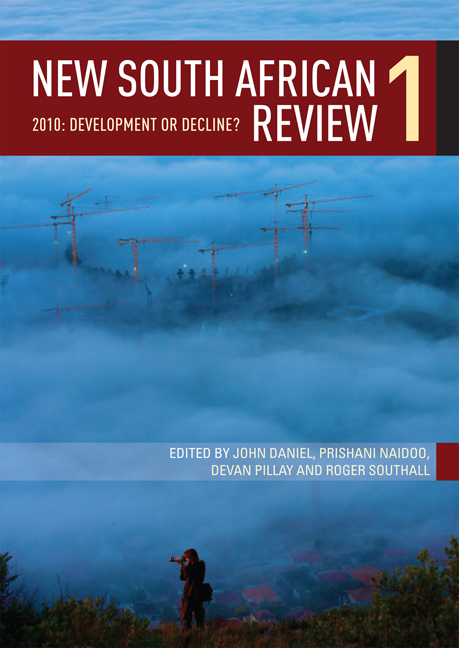Book contents
- Frontmatter
- Contents
- Preface
- Introduction South Africa 2010: From short-term success to long-term decline?
- PART 1 ECONOMY, ECOLOGY AND SUSTAINABILITY
- PART 2 STATE, POLITICS AND POLICY
- PART 3 EDUCATION, HEALTH AND LAND
- INTRODUCTION Reform and redress in higher education, health and land
- CHAPTER 11 ‘Silencing and worse …‘: The humanities and social sciences in South Africa
- CHAPTER 12 Realising transformation, equity and social justice in higher education
- CHAPTER 13 The polarising impact of South Africa's AIDS epidemic
- CHAPTER 14 Health for all? Towards a national health service in South Africa
- CHAPTER 15 The Comprehensive Rural Development Programme (CRDP): A beacon of growth for rural South Africa?
- CHAPTER 16 Breaking down barriers: Policy gaps and new options in South African land reform
- PART 4 Doreen Atkinson
- Contributors
- Index
CHAPTER 16 - Breaking down barriers: Policy gaps and new options in South African land reform
from PART 3 - EDUCATION, HEALTH AND LAND
Published online by Cambridge University Press: 21 April 2018
- Frontmatter
- Contents
- Preface
- Introduction South Africa 2010: From short-term success to long-term decline?
- PART 1 ECONOMY, ECOLOGY AND SUSTAINABILITY
- PART 2 STATE, POLITICS AND POLICY
- PART 3 EDUCATION, HEALTH AND LAND
- INTRODUCTION Reform and redress in higher education, health and land
- CHAPTER 11 ‘Silencing and worse …‘: The humanities and social sciences in South Africa
- CHAPTER 12 Realising transformation, equity and social justice in higher education
- CHAPTER 13 The polarising impact of South Africa's AIDS epidemic
- CHAPTER 14 Health for all? Towards a national health service in South Africa
- CHAPTER 15 The Comprehensive Rural Development Programme (CRDP): A beacon of growth for rural South Africa?
- CHAPTER 16 Breaking down barriers: Policy gaps and new options in South African land reform
- PART 4 Doreen Atkinson
- Contributors
- Index
Summary
In March 2010, the new minister of rural development and land affairs, Mr Gugile Nkwinti, declared: ‘Food security and economic growth are being undermined by the collapse of more than 90 per cent of the farms that the government [has] bought for restitution or redistribution to victims of apartheid’ (Times Live 2 March 2010).
This is a serious indication that all is not well with land reform. This chapter will argue that black farmers have been set up for failure by a government bureaucracy which is out of its depth when it comes to implementing a vast programme of social engineering. There are significant blind spots in land reform policy which can no longer be ignored. These are attributable to theoretical assumptions which have become so sacrosanct that they now block considera tion of alternative solutions. The intention here is not to allocate blame, for in fact the tortuous process of land reform over the last fifteen years was a necessary precursor to reassessing the naive assumptions which informed the policy at its inception. The stage is now set for a new debate on agricultural and developmental realities, stripped of the ideological straitjackets which have thus far constrained policy makers. This chapter will argue that, counter to much current thinking on land reform, the commercial agricultural sector needs to be regarded as a partner in land reform design – at policy design level as well as the implementation of projects. South Africa's commercial farming sector is a major asset in terms of knowledge, networks, markets and capital investment. A resource-poor, developmental state will be short-sighted if such resources are not harnessed for the purposes of social change.
It is commendable that the land reform process has been so exhaustively monitored and evaluated (Hall 2007: 88, 90). But there remains a major blind spot – the institutional mechanisms by which government bureaucracy functions. This chapter will reflect on the institutional weaknesses of the land reform machinery in South Africa.
The gist of the argument is as follows: South Africa inherited a ‘master narrative’ which encapsulated a set of values regarding the political and symbolic importance of land (Walker 2008). This narrative emphasises the loss of access to land by the black population, before and during the apartheid years, and the need to restore racial balance regarding land ownership. The need for land reform is therefore based on racial and equity arguments.
- Type
- Chapter
- Information
- New South African Review2010: Development or Decline?, pp. 364 - 382Publisher: Wits University PressPrint publication year: 2010



